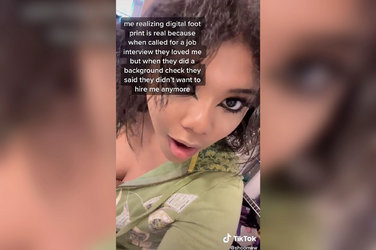Article | Archive
Young people are discovering that “digital footprints” are real — and a real problem for our most-online generation.
A TikTok user has gone viral after sharing their social media nightmare, claiming they missed out on a job because of something their potential colleagues had seen them post online.
“Me realizing the digital footprint is real because when called for a job interview they loved me but when they did a background check they said they didn’t want to hire me anymore,” the TikTok user, @shoomew, wrote in text over a recent video — with more than 4.1 million views since it was posted in October.
In a statement to The Post, the high school student, named Jayden, confirmed the story — and their disappointment.
“I was very shocked and sad even because it was such a good position!” Jayden told The Post in an email. “This wont change how I post because I feel like I’m already too far gone. Hopefully a TV career will take me instead one day haha.”
Older generations have historically approached the internet with caution amid early warnings about their traceable activities online. Gen Z, on the hand, was born well into the internet age. As a result, their online records started essentially from birth, well before they possessed the wherewithal to understand the potential consequences of their digital actions.

TikTok user @shoomew was “shocked” when her potential employers found her activity online — and rescinded their job offer because of it.TikTok / @shoomew

Cybersecurity pro Chris Southerland Jr. chimed in with advice on how to cover your digital tracks.TikTok / @chrisjr404
More than 7,000 users commented on the video, many of whom were aghast at Jayden’s misfortune — asking how to do a background check on themselves to avoid the same outcome.
“If my future employee ever sees this, please know that i have dreams, thank you,” a panicked user wrote.
“PLEASE I AM NOT MY INTERNET PERSONA,” another wrote.
Lucky for them, a cybercrime expert stitched the video with tips on how companies find potential candidates online.
“Here is how a company can find your digital footprint,” Chris Southerland Jr. captioned the 19-second video, which has been viewed 14.1 million times.
According to Southerland, there are “thousands” of tools companies can use to search your history — depending on the type of job you seek.
“Personally, I am not worried about what I post online whatsoever. If I did want to lock down my online presence, I would use a different real name, username, profile picture, and email for all my different social media accounts,” Southland later told BuzzFeed News.
Fortunately, he also said there are ways to hide some details on the World Wide Web.
Young people are discovering that “digital footprints” are real — and a real problem for our most-online generation.
A TikTok user has gone viral after sharing their social media nightmare, claiming they missed out on a job because of something their potential colleagues had seen them post online.
“Me realizing the digital footprint is real because when called for a job interview they loved me but when they did a background check they said they didn’t want to hire me anymore,” the TikTok user, @shoomew, wrote in text over a recent video — with more than 4.1 million views since it was posted in October.
In a statement to The Post, the high school student, named Jayden, confirmed the story — and their disappointment.
“I was very shocked and sad even because it was such a good position!” Jayden told The Post in an email. “This wont change how I post because I feel like I’m already too far gone. Hopefully a TV career will take me instead one day haha.”
Older generations have historically approached the internet with caution amid early warnings about their traceable activities online. Gen Z, on the hand, was born well into the internet age. As a result, their online records started essentially from birth, well before they possessed the wherewithal to understand the potential consequences of their digital actions.

TikTok user @shoomew was “shocked” when her potential employers found her activity online — and rescinded their job offer because of it.TikTok / @shoomew

Cybersecurity pro Chris Southerland Jr. chimed in with advice on how to cover your digital tracks.TikTok / @chrisjr404
More than 7,000 users commented on the video, many of whom were aghast at Jayden’s misfortune — asking how to do a background check on themselves to avoid the same outcome.
“If my future employee ever sees this, please know that i have dreams, thank you,” a panicked user wrote.
“PLEASE I AM NOT MY INTERNET PERSONA,” another wrote.
Lucky for them, a cybercrime expert stitched the video with tips on how companies find potential candidates online.
“Here is how a company can find your digital footprint,” Chris Southerland Jr. captioned the 19-second video, which has been viewed 14.1 million times.
According to Southerland, there are “thousands” of tools companies can use to search your history — depending on the type of job you seek.
“Personally, I am not worried about what I post online whatsoever. If I did want to lock down my online presence, I would use a different real name, username, profile picture, and email for all my different social media accounts,” Southland later told BuzzFeed News.
Fortunately, he also said there are ways to hide some details on the World Wide Web.
Last edited by a moderator: